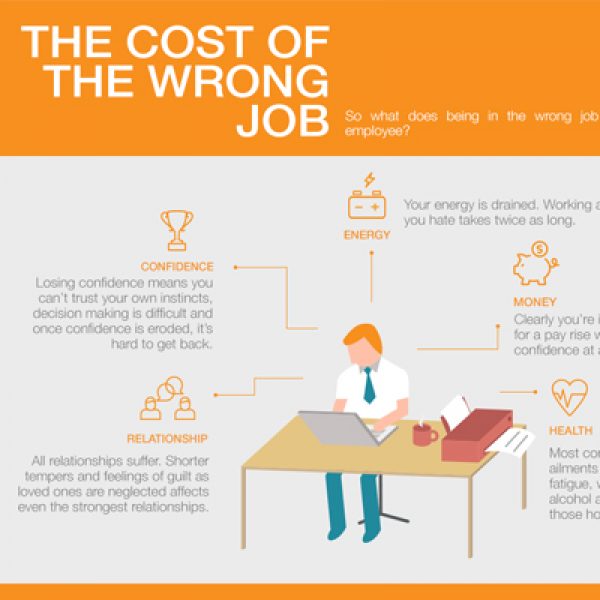
The Cost of the Wrong Job
by Marc Lander, Business Leader focused on Business Support, HR & Legal, and Sales and Marketing
So often we hear about how much a bad hire can cost a company, especially in monetary terms. However, we very rarely hear about how actually being in the wrong job can affect an employee.
According to recent studies from Dale Carnegie Training*, a staggering number of employees are disengaged or in other words, at the worst end of the spectrum – hate their jobs. A survey of 1,500 employees found that nearly half of us are “partially engaged.”
So what does being in the wrong job mean to the average employee? Here’s a simple infographic that sums it up. The cost of being in the wrong job is high.
Energy. Your energy is drained. Working at something you hate takes twice as long. It’s not just in the office, lacking in energy drains your private life of the good times and new opportunity. As the saying goes, you can’t give what you don’t have.
Confidence. Confidence ebbs and flows and is connected to your ego. It needs nurturing and bolstering from management, friends and loved ones. Losing confidence means you can’t trust your own instincts, decision making is difficult and once confidence is eroded it’s hard to get back.
Money. Clearly you’re in no position to ask for a pay rise and with energy levels and confidence at an all-time low, that promotion seems unrealistic to you and management. Going the extra mile is near on impossible.
Relationships. Ever snapped at a loved one because of something that happened at work? Stay in the wrong job and multiply this by 10. Feelings of guilt as family and loved ones are neglected for the wrong job can fester and sours even the strongest relationships.
Health. Ever heard of karoshi? When otherwise healthy Japanese business people suddenly keel over from exhaustion? That’s the extreme. For most of us it’s headaches, chronic illness, weight loss or gain and hours of precious time lost to extra sick days.
*Engaging Employees: What Drives Employee Engagement and Why It Matters. (MSW Research)

Leave a Comment
We’d love to hear from you! Share your thoughts or ask a question in the form below.